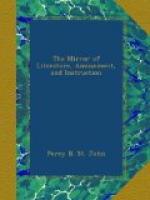LORD BYRON.
Letters and journals of lord Byron, with notices of his life, by Thomas Moore, Vol. ii.
[To attempt anything like an analysis of a “great big book,” of 823 pages, like the present, and that within a sheet of 16 pages, would be an effort of condensation indeed. Besides, the very nature of the volume before us will not admit of such a task being performed with much regard to accuracy or unique character. The “Letters,” of which, the work is, in great part, composed, are especially ill adapted for such a purpose; since, many of them become interesting only from manner rather than importance of matter. Horace Walpole’s Correspondence would make but a dull book cut in “little stars” in the letter style; and Lord Byron, as a letter writer, resembles Walpole more closely than any other writer of his time. His gay, anecdotical style is delightful—his epithets and single words are always well chosen, and often convey more than one side of the letter of a common-place mind.
Our sheet of Extracts is from such portions of Mr. Moore’s volume as appear to illustrate the main points of the Noble Poet’s character and habits, as the superscriptions will best explain—currente calamo from pages 22 to 769—within a few leaves of the Appendix.]
His sensibility.
With the following melancholy passage one of his journals concludes:—
“In the weather for this tour (of thirteen days) I have been very fortunate—fortunate in a companion (Mr. H.)—fortunate in all our prospects, and exempt from even the little petty accidents and delays which often render journeys in a less wild country disappointing. I was disposed to be pleased. I am a lover of nature, and an admirer of beauty; I can bear fatigue and welcome privation, and have seen some of the noblest views in the world. But in all this—the recollection of bitterness, and more especially of recent and more home desolation, which must accompany me through life, have preyed upon me here; and neither the music of the shepherd, the crashing of the avalanche, nor the torrent, the mountain, the glacier, the forest, nor the cloud, have for one moment lightened the weight upon my heart, nor enabled me to lose my own wretched identity in the majesty, and the power, and the glory, around, above, and beneath me——.”
On his return from an excursion to Diodati, an occasion was afforded for the gratification of his jesting propensities by the avowal of the young physician (Polidori) that—he had fallen in love. On the evening of this tender confession they both appeared at Shelley’s cottage—Lord Byron, in the highest and most boyish spirits, rubbing his hands as he walked about the room, and in that utter incapacity of retention which was one of his foibles, making jesting allusions to the secret he had just heard. The brow of the doctor darkened




